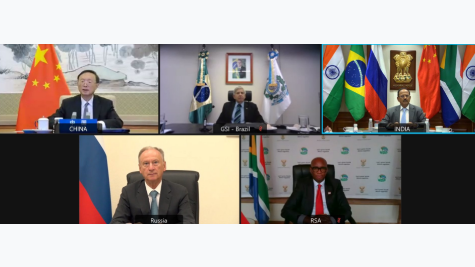
Heads of delegations at a meeting of BRICS High Representatives Responsible for National Security. /brics2021.gov.in
Heads of delegations at a meeting of BRICS High Representatives Responsible for National Security. /brics2021.gov.in
Editor's note: Freddie Reidy is a freelance writer based in London. He studied history and history of art at the University of Kent, Canterbury, specializing in Russian history and international politics. The article reflects the author's opinions and not necessarily the views of CGTN.
BRICS nations are due to meet virtually on September 9 for talks chaired by Indian Prime Minister Narendra Modi. The grouping comprised of Brazil, Russia, India, China and South Africa is meeting at a time of significant global and regional challenge.
Nations across the globe continue to battle the COVID-19 pandemic and focus efforts on economic reconstruction. Meanwhile, the situation in Afghanistan poses specific security concerns, with three member states sharing regional interests and China also sharing a border.
Chinese Foreign Ministry spokesman Wang Wenbin said that Afghanistan would be on the agenda for Thursday's summit and spoke of the commitment of BRICS to "communication and coordination" at an earlier fringe meeting of national security advisors.
On economic reconstruction, Alexi Gruzdev, the Russian deputy minister for trade and industry, said that there is "no doubt the pandemic has greatly affected all sectors of the economy. It has become a serious challenge to global trade and relations, forcing national economies to rebuild supply chains and re-establish links."
Part of the reconstruction effort relies heavily on vaccination and preventative measures, areas where China and Russia have led the group with their own vaccines as well as India's mass production of global vaccine options. Referring to this, Gruzdev praised the group's endeavors, saying "the five BRICS countries have set an example of open international cooperation in terms of combating COVID-19."
While vaccine production has been high within the group, attention will naturally turn to what additional support or expertise can be provided to nations that are struggling. Brazil, for example, has a death toll of 584,000, second only to the United States.
Beyond direct action over COVID-19, the BRICS group will also discuss the continued development of the group's multilateral institutions. On September 2, the Shanghai-based BRICS New Development Bank (NDB) welcomed its first non-BRICS members – Bangladesh, the United Arab Emirates and Uruguay.

The inauguration ceremony of the BRICS Partnership on New Industrial Revolution Innovation Center is held in Xiamen, southeast China's Fujian Province, September 7, 2021. /Xinhua
The inauguration ceremony of the BRICS Partnership on New Industrial Revolution Innovation Center is held in Xiamen, southeast China's Fujian Province, September 7, 2021. /Xinhua
Commenting on the development, bank president Marcos Troyjo confirmed the growth ambitions for the institution, saying "We will continue to expand the bank's membership in a graduated and balanced manner." Troyjo also underscored the value to constituent members with a pledge that "new members will have in NDB a platform to foster their cooperation in infrastructure and sustainable development."
Indeed, the bank, founded in 2015, has been a significant success story for BRICS. Currently, there are over 80 projects underway in all five member states worth in excess of $30 billion. Projects range from digital innovation to sanitation, and water to transport, ensuring continued growth and development which underscores the primary development goals of BRICS as a whole.
Running alongside the NDB is the Contingency Reserve Arrangement, a financial safety net and crucially a mechanism outside of significant U.S. influence.
While U.S. President Joe Biden's promise of America being "back" and alliances being "back" look to be increasingly hollow, the White House is continuing to witness multilateral organizations such as BRICS, the European Union, ASEAN and TPP cease to conduct international business and diplomacy through the prism of the interests of the U.S. State Department.
It is for this reason that India has signaled intent to use BRICS coordination to attempt to reform multilateral institutions at the 13th summit. With the WTO, IMF, World Bank and UN all included within the discussion framework. BRICS represents 42 percent of the global population and Modi is counting on the strength of that mandate.
Indian Minister of External Affairs Subrahmanyam Jaishankar spoke of BRICS' growing consensus and maturity as an organization at 15 years old with "thoughts shaped, and a world view concretized, with a growing sense of responsibilities."
In reference to working toward a less U.S.-centric framework of multilateral organizations, Jaishankar highlighted the important role BRICS has to play. "Counter-dominance instinct and principled commitment to multipolarity in all forms … is written into the DNA of BRICS."
While the challenges of COVID-19, economic recovery and global security are imposing, with the U.S. seemingly committed to isolationism, the importance and opportunity multilateral institutions hold is an opportunity which nations must seize.
(If you want to contribute and have specific expertise, please contact us at opinions@cgtn.com.)

